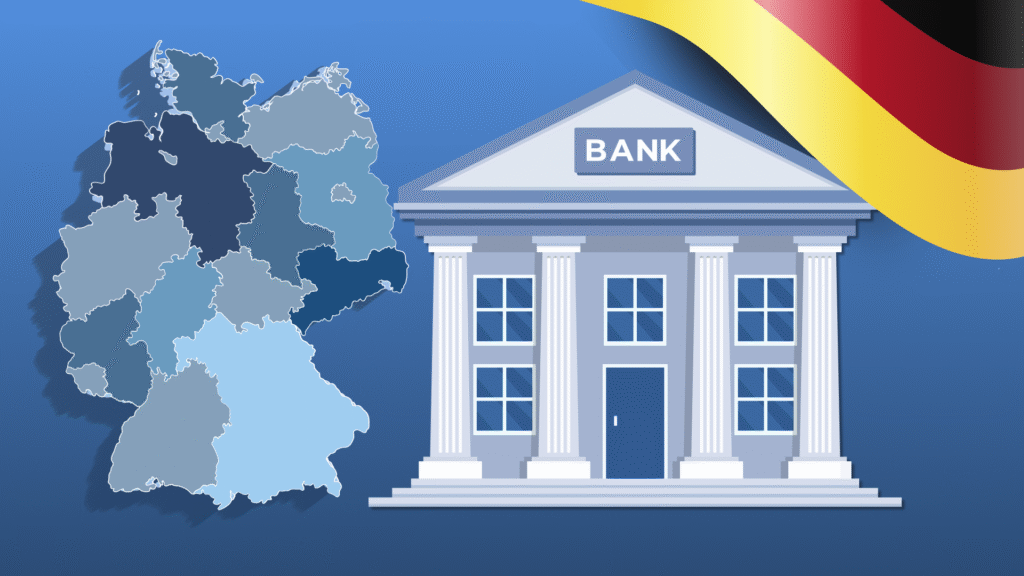Best Banks in Germany

| Bank | Rating | APY | Bonus | Monthly Fee | Link |
|---|---|---|---|---|---|
| Deutsche Bank Germany’s Largest Bank |
4.8/5 | Up to 1.2% | €100 welcome bonus | €0–€3 | Visit Deutsche Bank |
| Commerzbank Popular for Free Accounts |
4.6/5 | Up to 1.0% | €50 joining bonus | €0–€2 | Visit Commerzbank |
| KfW Bank State-Owned Development Bank |
4.9/5 | N/A | N/A | €0 | Visit KfW Bank |
| DZ Bank Cooperative Bank Network |
4.4/5 | Up to 0.8% | N/A | €0–€1.5 | Visit DZ Bank |
| UniCredit Bank (HypoVereinsbank) Part of UniCredit Group |
4.3/5 | Up to 1.1% | €75 bonus offer | €0–€2 | Visit HypoVereinsbank |
| LBBW Landesbank Baden-Württemberg |
4.2/5 | Up to 1.0% | N/A | €0–€2 | Visit LBBW |
| BayernLB Bayerische Landesbank |
4.1/5 | Up to 0.9% | N/A | €0–€2 | Visit BayernLB |
| NordLB Norddeutsche Landesbank |
4.0/5 | Up to 0.8% | N/A | €0–€2 | Visit NordLB |
| Helaba Landesbank Hessen-Thüringen |
4.3/5 | Up to 1.0% | N/A | €0–€1.5 | Visit Helaba |
| ING-DiBa Best for Online Banking |
4.7/5 | Up to 1.5% | €50 welcome bonus | €0 | Visit ING-DiBa |
Top German Banks List
Deutsche Bank
- Extensive branch network across Germany
- Award-winning mobile & online banking tools
- Strong global presence and multi-currency support
- Monthly fees (€6.90–€13.90) unless account conditions are met
- Low interest on standard savings
Read more ↓
| APY | ≈2.75% on savings accounts |
|---|---|
| Currency | EUR |
| Account Opening | Online & in-branch (English support) |
| Monthly Fee | €6.90–€13.90, waived with conditions |
| U.S. Citizens | Yes (may require documentation) |
| Non‑EU | Allowed (Anmeldung, ID required) |
| Annual Interest | Paid monthly/quarterly depending on account |
Deutsche Bank is one of Germany’s largest banks, offering a wide range of services including retail, corporate, and wealth management. Known for its robust global network and multilingual support, it carries monthly fees unless you meet deposit or usage criteria. Interest on standard savings remains modest.
Commerzbank
- No monthly fee with minimum account activity
- Good digital banking app
- Wide branch and ATM network
- Lower interest rates on savings
- Fees for international transfers
Read more ↓
| APY | ≈2.5% on savings |
|---|---|
| Currency | EUR |
| Account Opening | Online or in-branch |
| Monthly Fee | €0–€9.90 (fee waiver conditions) |
| U.S. Citizens | Yes |
| Non‑EU | Allowed (with ID, proof of residence) |
| Annual Interest | Paid monthly |
Commerzbank is a major retail and corporate bank offering fee-free checking if you meet minimum deposit or activity requirements. The digital platform is solid, though savings yields and transfer pricing are average.
KfW Bank
- Government-backed development financing
- Excellent rates for green loans & student support
- No consumer account fees
- Not a retail account provider
- Access only via partner banks
Read more ↓
| APY | N/A (loan focus) |
|---|---|
| Currency | EUR |
| Account Opening | Through partner banks |
| Monthly Fee | N/A |
| U.S. Citizens | Loan-eligible with residency |
| Non‑EU | Possible via partners |
| Annual Interest | Not applicable (loans) |
KfW is Germany’s government development bank—offering subsidized loans for housing renovation, student financing, and green tech. It doesn’t provide consumer checking accounts directly.
DZ Bank
- Central bank for cooperative banks
- Strong corporate & wholesale services
- Advanced digital offerings
- Not directly accessible to individuals
- Limited retail product range
Read more ↓
| APY | Varies via cooperative partners |
|---|---|
| Currency | EUR |
| Account Opening | Through local Volks-/Raiffeisenbank |
| Monthly Fee | Partner bank rates |
| U.S. Citizens | Allowed via local partner |
| Non‑EU | Allowed via partner bank |
| Annual Interest | Depends on partner |
DZ Bank supports Germany’s network of cooperative banks (e.g., Volksbanken) and provides wholesale and corporate financing. Retail customers connect to it through their local cooperative bank.
UniCredit Bank (HypoVereinsbank)
- Strong European network via UniCredit
- Modern digital banking features
- Support for expats in Germany
- Monthly fee ~€5 unless salary is deposited
- Limited free ATM withdrawals outside Germany
Read more ↓
| APY | ≈2.7% on savings |
|---|---|
| Currency | EUR |
| Account Opening | Online & in‑branch |
| Monthly Fee | €0–€5 (waived with payroll) |
| U.S. Citizens | Yes (KYC applies) |
| Non‑EU | Allowed (ID, proof of address) |
| Annual Interest | Paid monthly |
HypoVereinsbank is part of the Italian UniCredit group, offering a solid European account option with competitive savings and decent digital tools—monthly fees can be avoided with payroll setup.
Landesbank Baden-Württemberg (LBBW)
- Strong regional presence in Baden‑Württemberg
- Quality corporate banking services
- Personalized advisory services
- Limited retail savings rates
- Account fees vary by region
Read more ↓
| APY | ≈2.3% on savings |
|---|---|
| Currency | EUR |
| Account Opening | Branch-based |
| Monthly Fee | €0–€8 (region dependent) |
| U.S. Citizens | Yes |
| Non‑EU | Allowed (Anmeldung) |
| Annual Interest | Paid monthly |
Landesbank Baden‑Württemberg (LBBW) emphasizes corporate and regional banking solutions. Retail clients receive solid service, though rates and fees depend largely on local branches.
BayernLB (Bayerische Landesbank)
- Tailored corporate and municipal services
- Support for medium-sized enterprises
- Regional development financing in Bavaria
- Not for standard consumer banking
- Limited retail account options
Read more ↓
| APY | Not applicable |
|---|---|
| Currency | EUR |
| Account Opening | By referral or corporate |
| Monthly Fee | Corporate pricing |
| U.S. Citizens | Yes (corporate only) |
| Non‑EU | Allowed (depending on service) |
| Annual Interest | Not applicable |
BayernLB provides specialized banking services to corporations and government entities in Bavaria—standard consumer accounts are not their focus.
NordLB (Norddeutsche Landesbank)
- Focus on northern Germany and Netherlands
- Strong agricultural & shipping sector services
- Corporate and public sector expertise
- Minimal retail presence
- Limited consumer products
Read more ↓
| APY | Not available (wholesale focus) |
|---|---|
| Currency | EUR |
| Account Opening | Corporate referral |
| Monthly Fee | Corporate pricing |
| U.S. Citizens | Yes (institutional) |
| Non‑EU | Allowed (institutional) |
| Annual Interest | Not applicable |
NordLB operates mainly in northern Germany, serving agribusiness, shipping, and the public sector. Retail customers typically access banking via partner institutions.
Helaba (Landesbank Hessen-Thüringen)
- Strong support for municipal and state financing
- Wholesale and institutional expertise
- Stable Landesbank structure
- No retail banking operations
- Services limited to business and public sector
Read more ↓
| APY | Not applicable |
|---|---|
| Currency | EUR |
| Account Opening | Institutional only |
| Monthly Fee | Negotiated |
| U.S. Citizens | Yes (institutional) |
| Non‑EU | Yes (institutional) |
| Annual Interest | Not applicable |
Helaba is a central public bank for Hesse and Thuringia, operating in corporate and municipal finance. It does not provide retail banking services.
ING-DiBa
- Fully online with no monthly fees
- High customer satisfaction
- Strong savings interest rates
- Few physical branches
- Some services require online identification
Read more ↓
| APY | Up to 3.5% |
|---|---|
| Currency | EUR |
| Account Opening | Fully online |
| Monthly Fee | €0 (standard account) |
| U.S. Citizens | No (currently restricted) |
| Non‑EU | Allowed (with German address) |
| Annual Interest | Paid monthly |
ING-DiBa is one of Germany’s leading direct banks, known for competitive savings rates and a fully digital experience—ideal for tech-savvy users who don’t require branch access.
Did you find this article helpful?










